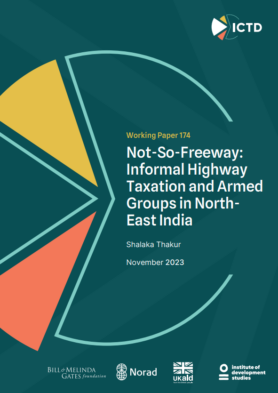Working Paper 174
What are the effects of rebel taxation? Along arterial roads in north-east India, various non state armed groups collect ‘tax’ – of different types and amounts, with varied degrees of coercion and systematisation. Based on extensive fieldwork, including 100 interviews with non-state armed groups, businesspeople and state actors, this paper uses the lens of the transit economy in the Indian state of Manipur along the Indo-Myanmar border to identify the long-term effects of rebel taxes and the taxation ecosystem. It finds that taxation by armed groups shapes the business environment, has pervasive implications on the legitimacy of state governance, and creates a political order that lies between active conflict and peace. The paper further shows that these effects of rebel taxation can be best understood through an interplay of institutional factors, the number of groups present, and the relationship between the state and rebel groups.
